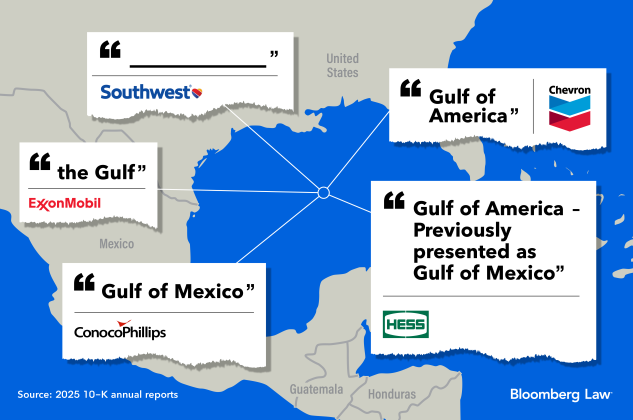- Oil companies take sides in Trump’s Gulf of America rebranding
- Southwest Airlines avoids naming body of water in annual report
ConocoPhillips and Exxon Mobil are avoiding the “Gulf of America.” Chevron and Hess are jumping in.
President Donald Trump’s new name for the Gulf of Mexico, as it has been known since the 16th century, is fueling a corporate divide over what to call the body of water stretching from Florida to Texas. Big companies with ties to the area have deployed various aliases in communications with investors since Trump renamed the gulf in January—if they talk about it at all.
Other companies are more reticent.
Companies aren’t obligated to use the Gulf of America, said Chris Tucker, who advises the oil and gas industry on corporate messaging. But embracing the new name has the potential to help them, especially those with substantial business interests in the sea abutting America’s South, he said. Sticking with the Gulf of Mexico could come off as unnecessarily adversarial or disrespectful to the Trump administration, Tucker added.
“You learn as an executive that you shouldn’t fight every battle just because,” said Tucker, a senior managing director in FTI Consulting’s strategic communications segment. “You have to pick your fights.”
Mexico v. America
Of the roughly 20 S&P 500 members that have mentioned the Gulf of Mexico in communications with investors from 2020 to 2024, fewer than half are using its new name now, according to Bloomberg Law’s review of corporate filings.
Most of the companies that have referred in recent years to the Gulf of Mexico in shareholder communications have business tied to oil production there. The list also includes Southwest,
Chevron was an early adopter of the Gulf of America, with the name appearing on its website and in a Jan. 31 earnings release. The move came less than two weeks after Trump signed an executive order on Jan. 20 to replace US government references to the Gulf of Mexico with the new name. Chevron bills itself on its website as a “leading performer in the GOA,” with several offshore oil and gas extraction projects.
The order, and pending legislation to enshrine the Gulf of America into law, don’t require companies to use the name in their communications. But
“If Google Maps is using it—then Chevron is using it,” the oil major’s CEO, Mike Wirth, said in an interview with Bloomberg Television earlier this year.
Hess was slower to embrace the Gulf of America than Chevron, which is seeking to acquire it for $53 billion. Gulf of America didn’t appear in a Hess report to shareholders until the company said in its 10-K annual report on Feb. 27 that it was now using the new name for the Gulf of Mexico.
But at ConocoPhillips, the company continued to mention business in the Gulf of Mexico and on the “U.S. Gulf Coast” in its 2025 10-K. ConocoPhillips has investments in liquefied natural gas operations along the Gulf Coast, but has been selling stakes in offshore oil fields in the Gulf of Mexico.
“I’m sure that every company would much rather just call it by the indisputable legal name,” said Ann Lipton, a Tulane University law professor, who studies corporate governance. “But since there isn’t one, that means that any choice they make is necessarily going to read as political, even if they don’t want it to.”
Representatives of Chevron, Hess, and ConocoPhillips didn’t respond to requests for comment.
‘Vibe Shift’
Exxon has taken a more nuanced approach to how it communicates with investors and others since Trump took office in January.
Darren Woods, Exxon’s CEO, in a January earnings call praised Trump’s efforts to ease offshore drilling. His company also removed diversity, equity, and inclusion language from its annual report in February, amid the Trump administration’s effort to root out what it says is “illegal DEI.”
But the Gulf of America hasn’t emerged in Exxon’s corporate messaging.
The company had activities in 0.1 million acres of the Gulf of Mexico, according to its 2024 10-K filing. Now, in a 2025 10-K section describing its US activities, Exxon says those acres are in “the Gulf.”
Southwest went further, removing references it had to the Gulf of Mexico in its 10-K for years—and replacing it with nothing.
The airline mentioned the Gulf of Mexico from 2016 to 2024 in its 10-Ks in connection with Federal Aviation Administration air traffic operations over “large portions of the Atlantic and Pacific Oceans and the Gulf of Mexico.” Southwest in its 2025 10-K only talked about FAA activity concerning “large portions of the Atlantic and Pacific Oceans.”
An Exxon representative didn’t respond to requests for comment. A Southwest spokesperson declined to comment.
How companies communicate to shareholders about the body of water between Texas and Florida can help investors gain better insight into whether the businesses back Trump’s America First vision, said Luke Perlot, an associate director of the National Legal and Policy Center’s Corporate Integrity Project, which advocates against environmental and social initiatives at companies.
Many companies, like Exxon, were quick to distance themselves from DEI practices since Trump’s executive order. Changing language around the Gulf of Mexico falls in line with that strategy.
“It’s a small but interesting sign of the vibe shift in corporate America,” Perlot said.
To contact the reporter on this story:
To contact the editors responsible for this story:
Learn more about Bloomberg Law or Log In to keep reading:
See Breaking News in Context
Bloomberg Law provides trusted coverage of current events enhanced with legal analysis.
Already a subscriber?
Log in to keep reading or access research tools and resources.

